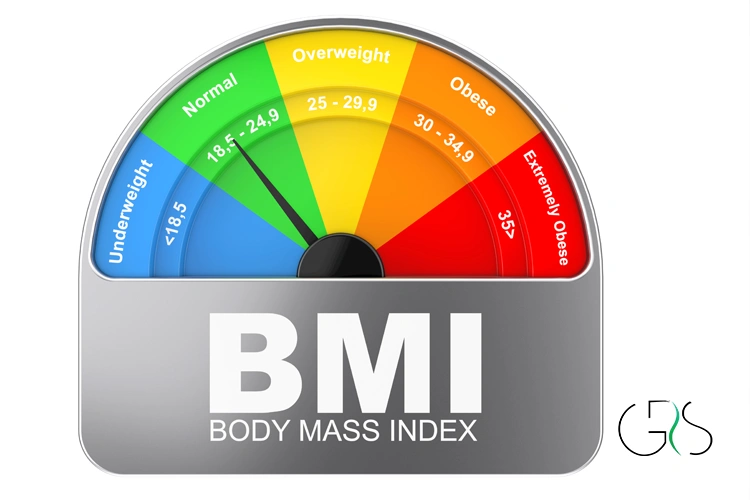What Can a Body BMI Calculator Really Tell You About Your Long-Term Health?
A body BMI calculator is a quick way to assess your weight in relation to height, but its true value lies in helping spot potential long-term health risks. Here’s what it reveals:
- Flags risks like heart disease, diabetes, and certain cancers based on BMI range
- Identifies underweight risks (low immunity, fatigue) or obesity concerns (stroke, sleep apnea)
- Works best when combined with waist size, body fat %, and lifestyle factors
- Not ideal alone—doesn’t account for muscle, fat location, or metabolic health
Use it as a starting point, not the full story, for managing your long-term well-being.
Body Mass Index (BMI) is one of the simplest tools to help you understand your weight in relation to your height. But behind that quick number of BMI lies a deeper story about your long-term health. Whether you’re trying to lose weight, maintain it, or simply learn more about your body, using a body BMI calculator can offer helpful insight into where you stand and what steps you might need to take next. In this article, we explore the health implications connected to different BMI ranges and why this number matters more than you might think.

What is a Body BMI Calculator and How Is It Used?
BMI is calculated by dividing your weight in kilograms by the square of your height in meters:
BMI = weight (kg) / [height (m)]²
If you prefer pounds and inches:
BMI = [weight (lb) / height (in)²] × 703
Once you plug in your numbers, you’ll be categorized into one of the following:
- Underweight: <18.5
- Normal weight: 18.5 – 24.9
- Overweight: 25 – 29.9
- Obese Class I: 30 – 34.9
- Obese Class II: 35 – 39.9
- Obese Class III: ≥40
These ranges help indicate your risk level for certain health conditions.
Weight
Height
Age

Why You Should Use a Body BMI Calculator
A body BMI calculator can be an eye-opening first step toward understanding your health. It’s not perfect, but it’s an easy way to flag whether your weight might be affecting your body more than you realize. It’s especially useful when combined with other health checks—like waist measurements or body fat percentage—to help build a more complete picture.

Why BMI Matters: Health Risks by Category
Underweight (BMI <18.5)
If your BMI falls below the healthy range, it could be a sign that your body isn’t getting the nutrients it needs. You might face:
- A weaker immune system
- Low energy or fatigue
- Difficulty with fertility
- Brittle bones and a higher risk of fractures
It’s important to work with a health professional if you’re underweight to identify the root cause and create a plan.
Normal Weight (BMI 18.5 – 24.9)
Being in the “normal” range is generally a good sign—but it doesn’t give you the full story. Even people with a healthy BMI can face health issues, especially if they have excess belly fat or don’t exercise regularly. It’s all about lifestyle, not just numbers.

Overweight (BMI 25 – 29.9)
Carrying a few extra pounds doesn’t always feel like a big deal—but it can slowly take a toll on your body. Risks at this stage include:
- High blood pressure
- Insulin resistance
- Increased cholesterol levels
- Greater likelihood of type 2 diabetes and heart disease
It’s a good idea to monitor your habits closely and make small lifestyle changes now to avoid bigger problems later.
Obesity (BMI ≥30)
Obesity has been linked to many serious health conditions. If your BMI is in this range, you may be more likely to experience:
- Type 2 diabetes
- Heart disease and strokes
- Certain types of cancer
- Liver disease and sleep apnea
- Mental health challenges like anxiety or depression
Taking action—whether through diet, exercise, or medical support—can help lower these risks and improve your quality of life.

Scientific Studies Linking BMI and Long-Term Health
Researchers have found strong links between BMI and long-term health outcomes:
- A study in the Journal of the American Heart Association found that a 5-point increase in BMI raises your risk of heart disease by 30%.
- Obesity can increase your chances of developing type 2 diabetes by up to seven times, according to the Global BMI Mortality Collaboration.
- The American Cancer Society notes that about 40% of all cancers are linked to excess weight.
These studies show why even a small improvement in your BMI can make a big difference.
Limitations of BMI for Health: Why It’s Not the Whole Story
BMI is useful—but it doesn’t tell everything. Here’s why:
How a BMI Calculator Body Falls Short on Its Own
A BMI calculator body gives you a snapshot, but not the full picture. For example, athletes with lots of muscle may have a high BMI even though they’re very healthy. BMI doesn’t show where your fat is stored, and it doesn’t reveal how well your body systems are functioning.
It Doesn’t Tell Muscle from Fat
More muscle can make you appear overweight on paper—even if you’re actually in great shape.
It Doesn’t Show Fat Location
Fat stored around the belly is more dangerous than fat stored elsewhere. Waist size matters.
It Doesn’t Consider Ethnic Differences
Some people—especially those of Asian descent—may have higher health risks at lower BMIs.
BMI Ignores Metabolic Health
You can have a “normal” BMI and still have high blood pressure or poor blood sugar control.

Supplementary Tools for a Complete Picture
Instead of relying on BMI alone, try pairing it with these tools:
Waist Circumference
A large waist is a warning sign. Men with waists over 40 inches and women over 35 inches may have more health risks.
Body Fat Percentage
This tells you how much of your body is fat vs. muscle. It’s more telling than BMI in many cases.
Blood Work
Tests for cholesterol, glucose, and inflammation can uncover issues that BMI alone won’t show.
Fitness Level
Are you strong? Do you have endurance? Your physical ability says a lot about your overall health.

Long-Term Prevention Strategies Based on BMI Insights
Whatever your BMI, there are things you can do to live a healthier life:
Eat a Balanced Diet
Fill your plate with fruits, veggies, lean proteins, and healthy fats. Cut back on sugar and processed snacks.
Stay Active
Aim for 150 minutes of movement each week—whether it’s walking, dancing, swimming, or lifting weights.
Keep an Eye on Your Weight
Check your progress monthly with a body BMI calculator. Catching small changes early can prevent bigger issues later.
Prioritize Sleep and Stress Management
Sleep affects your weight and your hormones. Try to get 7–9 hours each night and manage stress with techniques like meditation or journaling.
Get Support When Needed
If your BMI is rising or your health is changing, don’t hesitate to talk to a doctor, dietitian, or wellness coach.
Conclusion: BMI and Long-Term Health
Your BMI gives you more than just a number—it gives you a window into your health. By using tools like the body BMI calculator and combining that info with other health markers, you can make informed choices that support your long-term well-being.
Whether you’re trying to reduce health risks or simply understand your body better, knowing your BMI is a great place to start. And remember: you’re not just a number—you’re a whole person with unique needs, goals, and strengths.
References
Centers for Disease Control and Prevention (CDC)-Body Mass Index (BMI)
World Health Organization (WHO)-Obesity and overweight
American Cancer Society-Excess Body Weight and Cancer Risk
American Heart Association-Body Mass Index and Association With Cardiovascular Outcomes in Patients With Stable Coronary Heart Disease – A STABILITY Substudy
The Lancet-Obesity in adults








